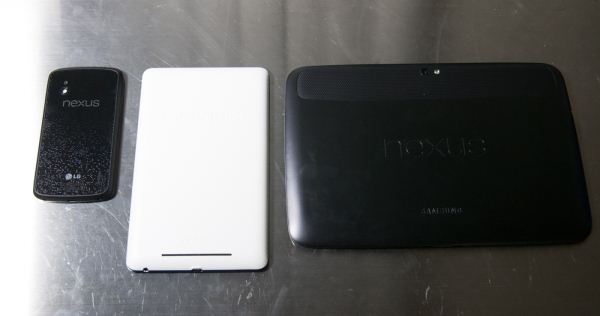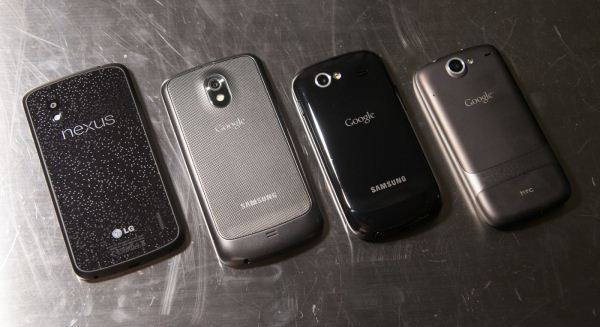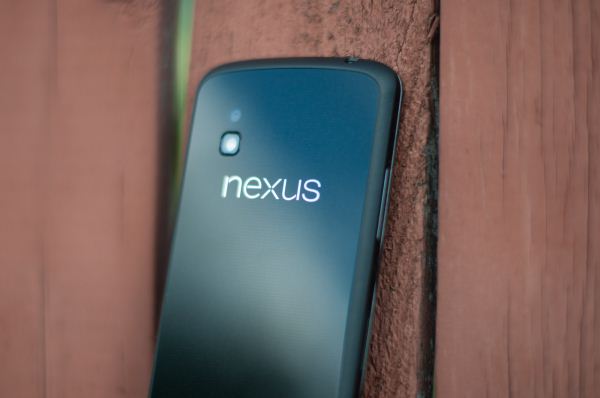Google Nexus 4 Review - Google's new Flagship
by Brian Klug on November 13, 2012 8:45 AM EST- Posted in
- Smartphones
- LG
- Android
- Mobile
- APQ8064
- Nexus 4
- Android 4.2
- MDM9215
With the Nexus 4 conclusion I really have to finish the way I started, namely by noting that this is now the fullest realization of Google's original strategy laid out for Nexus at its inception. The Nexus One had extremely aspirational goals for a first-gen Googlephone — it tried to change the way that phones are sold in the US and tried to deliver a fully carrier-agnostic reference platform for developers and OEMs to build out from. The end of that story is something everyone is familiar with, however — the Nexus One was largely a commercial failure. Little did we all know it would take several more iterations of the Nexus hardware and Android platform to get close to delivering on those goals, and Google has inched closer each time.
The next revisions of Nexus built on this platform, but only with Galaxy Nexus and its pentaband WCDMA radio and Nexus 4 do we see the fullest realization of this dream. Over time Google has built up the infrastructure required to deliver on its goals with things like the Play Store, a reputation among hardware vendors, and the right combination of hardware and software cadence to make this all work. The price point with the Nexus 4 is now low enough to not make off-contract sale an impossible to swallow deal.
With the Nexus 7 I felt like we were truly seeing the Nexus line come into its own. With Nexus 4 and 10 we're now seeing Google finally deliver a product lineup with offerings in each of the major size tiers. We now have a form factor of device for every two inches of diagonal difference.
With the Optimus G, LG truly went all the way toward delivering the best of everything it had to offer from all the different parts of LG — LG Chem, LG Innotek, LG Display. I'm very positive about the Optimus G hardware and very positive about the Nexus 4 as its close relative. LG's execution in the smartphone space has primarily been held back by its software approach and skins, and until recently a lack of updates. Getting a win for LG in the Nexus space basically mitigates that, as the software burden becomes entirely Google's, and obviously Nexus will continue to mean the latest and greatest Android platform updates for quite some time.
You can go back and read what I've written about the Nexus 4 hardware — in a word it's superb. In-hand feel is awesome thanks to the rubber ring running around the perimeter of the Nexus 4, and build quality is also very good. I've fully disassembled my Nexus 4 three times and put it together without issue, and the Nexus 4 has taken a few trips to the floor (my fault) without any adverse effects.
Finally, there's also the matter of price. For $299 you can get the latest and greatest hardware and 8 GB of storage, and for $349 you can get double that storage with 16 GB (12.92 GB usable). Both are fully unlocked and carrier-agnostic, and at those prices the Nexus 4 pretty much blows the doors off of any other unlocked or out of contract smartphones, which usually end up being priced at around $600 or more.
If you're an Android enthusiast, the Nexus 4 is obviously the phone to have right now. The combination of APQ8064 and MDM9x15 is excellent in spite of some unfortunate thermal throttling, and we'll be seeing many more Fusion 3 based devices in time at prices well above the Nexus 4 out of contract. At a fundamental level there is quite literally no better vehicle out there for Google to communicate its smartphone platform via than the yearly Nexus refresh. On its own, the Nexus 4 would otherwise be phenomenally great hardware. As a Nexus, it's a level even beyond that.
Google has come an exceptionally long way since that first Nexus One.













188 Comments
View All Comments
amdwilliam1985 - Tuesday, November 13, 2012 - link
These smart phones and tablets are the old computing devices that you used to love in a new form and shape.I can't remember the last time I got excited about "computer" hardware.
phillyry - Thursday, November 15, 2012 - link
+1A5 - Tuesday, November 13, 2012 - link
Intel, AMD, and Nvidia only really do 1 hardware launch a year now, the motherboards are all essentially the same, and driver reviews are borrrrrring to perform and read.They're still putting up like 3-4 case reviews a month, but there really isn't much else to talk about besides mobile stuff anymore.
Sabresiberian - Tuesday, November 13, 2012 - link
I don't read every article Anandtech publishes; in fact, if there is an article I just skim through, or skip entirely, it will be one about any kind of mobile computing, including smart phones. It doesn't bother me though that Anandtech spends as much time on these things as they do because they still do plenty of high quality articles on mainboards, CPUs, graphics cards, PSUs - the things I am interested in, and they have added editors to cover additional types of hardware, and, bottom line, I don't expect everything they publish to have me in mind.;)
Impulses - Tuesday, November 13, 2012 - link
They still do more in depth CPU and architecture articles than most sites, probably due in large part to Anand's knowledge and contacts. They've been doing a ton of case reviews too... Motherboards have been boring for quite a while. I don't think any of that content has suffered much. The one thing I'd say has suffered is GPU reviews, Anand does a great job of analyzing new architectures at times but their benchmark methods (and variety of tested resolutions) pale in comparison to other sites IMO.Impulses - Tuesday, November 13, 2012 - link
Not that I'm complaining mind you, there's other places to read about that stuff... However none of the quasi-blogs that cover the mobile industry do phone reviews as detailed and in depth as AT. Something as simple as standardized battery testing seems to elude the entire web outside of AT, at best you might find rundown tests with a movie or something lazy like that.tipoo - Tuesday, November 13, 2012 - link
It's just about speed of updates. There's a new top end smartphone every other day, while CPU architectures don't make big changes for up to two years and GPUs at least a year.phillyry - Thursday, November 15, 2012 - link
Home-made desktop PCs are verging on irrelevant.Mobile is where it's heading.
Don't get me wrong, it still exists but it's just becoming less and less relevant.
darklight0tr - Tuesday, November 13, 2012 - link
I have a Galaxy Nexus and was looking to possibly upgrade to the Nexus 4 but there are a few big issues with the phone for me:1. No LTE and it isn't available on Verizon (at least right now).
2. Max of 16GB flash memory. I have the LTE Nexus and enjoy the 32GB of flash memory.
3. Headphone jack and charging port are on OPPOSITE sides of the phone. This is the biggest fail for me. I use my Galaxy Nexus in my car nearly every day and having those two connectors on the same side is very important.
Its too bad because it looks to be a great phone otherwise.
Despoiler - Wednesday, November 14, 2012 - link
The Nexus 4 will never come to Verizon. Not including LTE was primarily a political move, secondary a battery life consideration, and tertiary for SKU simplicity.Verizon had their hands all over the Android releases on the Samsung Nexus causing them to be delayed or scrapped for the next release. It's a dev phone though. Google needs to be able to roll out whatever it wants to when it wants to. Breaking carrier control on handsets is part of what Google has been trying to do with their Nexus phones.
32GB of memory is unnecessary with Google services like Music and Drive. Everything is on the cloud so why does it also need to be on your phone?